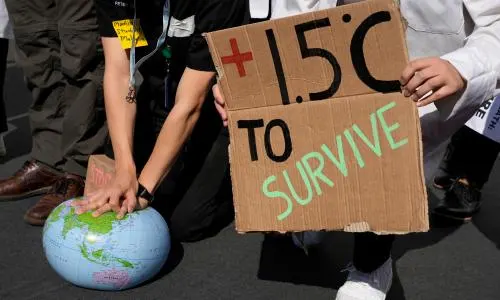A major report by the UN has found that governments are not doing enough to cut greenhouse gas emissions fast enough to meet the goals of the Paris agreement and to stave off climate disaster.
The report said that meeting the goals will require “phasing out all unabated fossil fuels”, in an acknowledgment that some oil-producing countries may find hard to take.
The need to phase out fossil fuels has not been explicitly adopted by the UN before, under successive rounds of climate talks, and language over “phasing out” or “phasing down” fossil fuels has caused controversy at the annual UN climate talks.
According to findings of the report, there is a “rapidly narrowing window” for governments to move faster, as global greenhouse gas emissions must peak by 2025 at the latest, and be rapidly reduced from there, to limit temperature rises to 1.5C above pre-industrial levels.
It found that emissions are still rising, however, and there is a gap of 20 to 23 gigatonnes of CO2 between the cuts needed by 2030 to limit global temperatures to 1.5C and the world’s current emissions trajectory.
Read also: Heat exhaustion queries rises to 552% on NHS website
The 47-page UN report will form the basis of the first “global stocktake” under the 2015 Paris agreement. That process is meant to track countries’ efforts to meet the goals of the treaty. However, it does not set out in detail which countries are falling behind, nor does it contain specific recommendations directed at particular countries or regions.
Instead, the global situation is described in broad and general terms that were largely predictable, as it has been clear for some time that the world is far off track to stay within the tougher of the Paris goals, of limiting temperature rises to 1.5C above pre-industrial levels.
Ani Dasgupta, who is the head of the World Resources Institute thinktank, noted that the bland tone of the report disguised a catastrophic failure.
He said: “The UN’s polite prose glosses over what is a truly damning report card for global climate efforts,”. “Carbon emissions? Still climbing. Rich countries’ finance commitments? Delinquent. Adaptation support? Lagging woefully behind. This report is a wake-up call to the injustice of the climate crisis, and a pivotal opportunity to correct course.”
Story was adapted from the Guardian.
